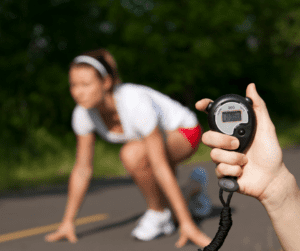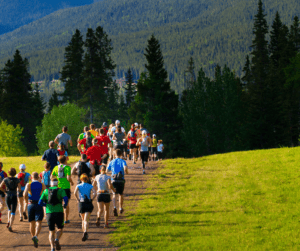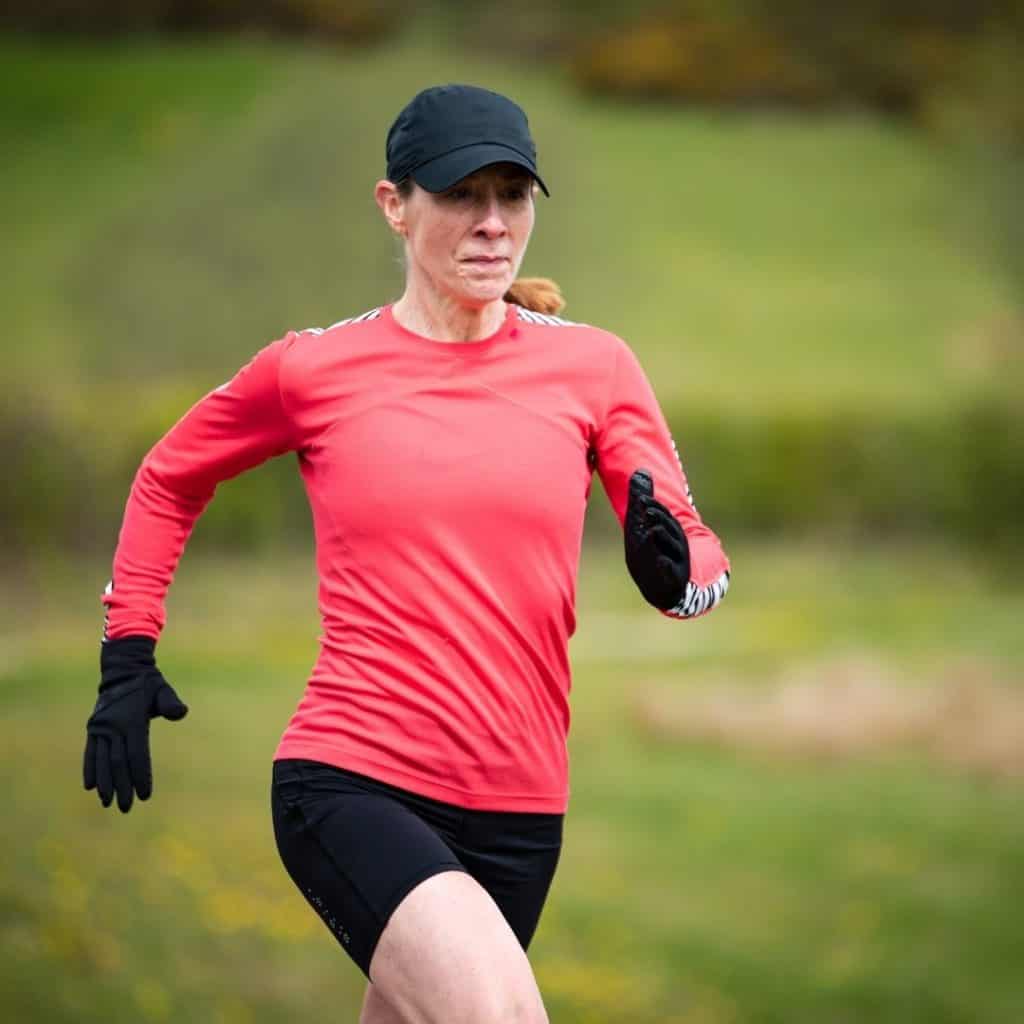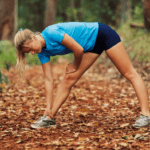Sub- 50 min 10 km… Sub- 25 min 5kms… and Sub-3-hour marathons…
Most women going through menopause feel like their days of breaking Personal Records are over.
We’re here to tell you that they most certainly are not …
In fact, they’re just beginning.
Research suggests that a lack of the correct nutrition, decreased muscle synthesis, fluctuating hormones, loss of muscle strength, and not enough recovery time – contribute to a slower running pace.
BUT…
With the right training framework consisting of strength training, recovery, consistency, nutrition, and intensity/pace training, women going through menopause can run faster than they ever did before.

We’ve all heard it before… “Middle-aged women should rather opt for a gentle stroll” and that’s what you’re told to believe.
The truth is that middle-aged women, who are going through menopause are strong and capable of a lot more than society makes them out to be.
The Link Between Running and Menopause
Throughout the different stages of menopause, women experience a dramatic drop in estrogen levels. This can negatively affect a women’s physiological assets, such as lean muscles, strong bones, and the ability to bounce back from a run with restorative, protein-synthesizing sleep.
Here’s some good news for runners going through menopause: Hormonal changes are easier to combat compared to the unstoppable guarantee of time.
It has been discovered that a lack of estrogen (not aging) is the reason for bone deterioration, fat gain, and lean-muscle loss associated with menopause.
Running is a fantastic way to stimulate bone growth and has many other benefits that help contribute to combating the symptoms of menopause.

Bone Density & Running
Visualize your muscles and how strengthening makes them bigger. This is how your bones can become stronger if you put stress on them.
Our bodies build bone mass when we apply stress along the entire length of our bones. This happens when we run.
Bones build structure in response to the stresses applied to them, and for the weight-bearing bones, such as those in our legs and hips. The greater the stress, the greater the bone-building response, which is what menopausal women need.
Bear in mind, runners with Osteoarthritis might find running on some days to be too high-impact and painful, which is why we suggest following a running training program that includes ongoing support, feedback, and adjustment with a particular focus on the correct type of strength training for Osteoarthritis.
The program should also include advice on recovery as recovery becomes even more important when someone has OA. (That is why we created our Running Through Menopause Training Framework)
Running helps women address the frustrating symptoms of menopause such as reducing hot flashes, improving sleep, and improving cardiovascular function. Running has even helped women alleviate pain in their joints as well as helped in combatting depression.
Is It Harder To Improve My Times During Menopause?
We’re not going to tell you that it’s harder because that depends on a lot of outlying factors, but we are going to tell you that by adapting your training program and by following these five pillars, your chances of running faster and recovering faster will be increased.
Five Pillar Framework For Running Through Menopause
- Recovery
- Pacing/Intensity
- Strength Training
- Nutrition
- Consistency
Jump over to our blog: A Definitive Guide to running To, Through, and Long After Menopause, where we dive a lot deeper into each of these pillars.

Estrogen plays a key role in the way your blood vessels expand and constrict (Vasodilation) according to what is happening inside & outside your body.
Trying to increase your speed may feel “harder” because your blood pressure and temperature perception shift. Your running may also feel more difficult because having lower estrogen levels triggers your body to store fat instead of building muscle.
It may seem like trying to break your PR’s while experiencing hot flushes, joint pain, muscle loss, and other symptoms of menopause would only be a difficult & unrealistic task, but the truth is that menopause doesn’t mean the end of being a competitive athlete. By modifying your routine, you can continue running longer and stronger through perimenopause into post-menopause.
How Is Menopause Affecting My Speed?
Menopause causes chaos to your physiological assets, it feels like such a setback to know that you have literally spent a lifetime building strong bones, lean muscles, and the ability to recover properly with an adequate night’s sleep; yet menopause can just deteriorate it all within a few years.
Menopause can affect your speed, it depends on which way you look at it though.
In one way, yes, menopause can make you slower, if you allow it to – by not making any adaptations to your training.
On the other hand, yes, menopause can affect your speed, positively.
Coach Parry has helped and witnessed countless women train their way through menopause and beat the times they were running before they started going through menopause. These women followed the five pillars as mentioned above, as well as the Coach Parry Running Through Menopause Masterplan.

How To Run Faster Through Menopause
The key is to be mindful that menopause is completely natural and that even if some parts are challenging, there are better runs ahead of you as long as you understand that there are new ways to train as a 50-plus-year-old female runner.
The Way To Run Faster Through Menopause Is To:
- Ensure you give yourself enough time to recover from your runs sufficiently.
- Ensure that you are running your easy runs EASY.
- Ensure that you give your bones a multi-directional load via Strength Training
- Ensure that you are eating sufficiently to fuel your training.
- Ensure that you are consistent in following your training and recovery schedule.
That’s just the 10,000-foot view, we dig deeper into each of these in this Running Through Menopause article.
How To Avoid Injury While Running Faster Through Menopause
- Strength Training is Priority number one.
- Avoid uneven surfaces.
- Avoid an incorrect running technique, poor running style can increase the risk of injuries.
- Manage expectations.
- Make sure you recover well!
- Follow a structured training plan to ensure you are progressing your running slowly and properly.
(The good news is we’ve created a free strength training plan specifically for women who are wanting to run to and through menopause. You can download that plan by clicking here.)

Why You Should Continue Running Your Way Through Menopause
Menopause is a fact of life and it will affect each woman differently, but staying fit can help with many symptoms, what’s even better is that all the positive benefits of running (physical and mental well-being) still apply.

Join us for a free online presentation of the…
The Running Through Menopause Masterclass
…and discover how you can run well (and faster) as you get older, without training more or harder than you currently are, all while avoiding injury.
If it feels like you’re training harder than ever but not running the paces you’d like to be running or if you’re constantly tired, fatigued or running in some sort of pain, then this is specifically for you.
Save Your Seat In This Training Now…
If you’d like to learn more about continuing to run through menopause, we recommend reading this article: Running & Menopause: The Definitive Guide to Running To, Through and Long After Menopause




Comments are closed.